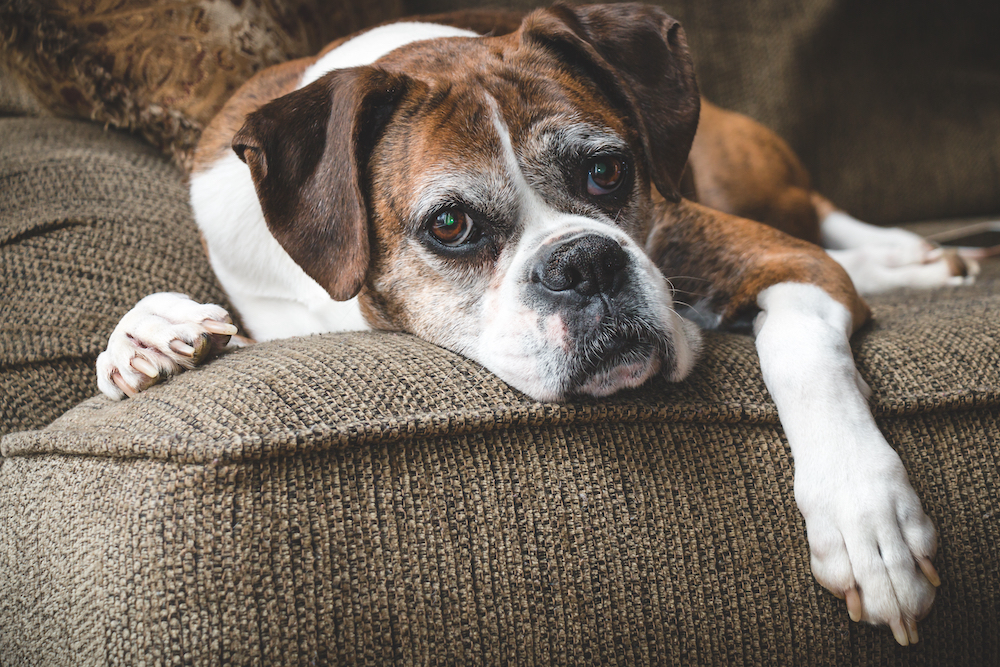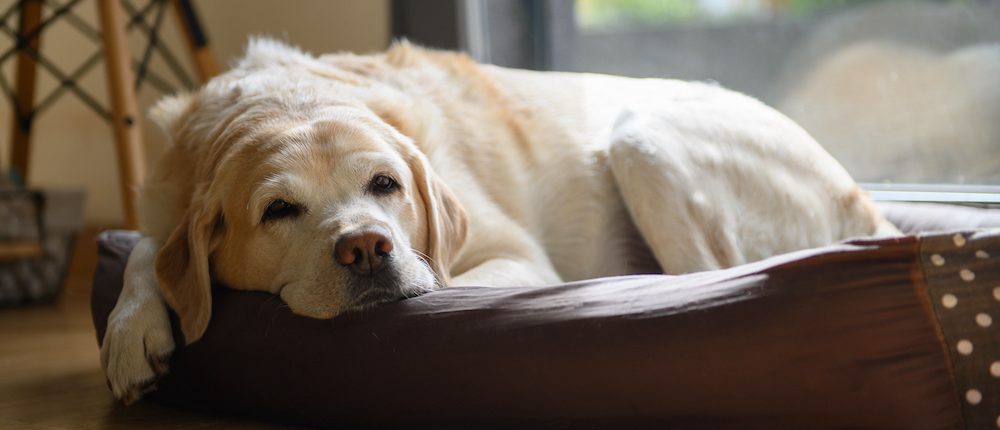A trained adult dog having an accident in the house can be upsetting on more than one level. There’s the immediate unpleasant task of cleaning poop off of your floor, carpet, or bedding. And, worse yet, there’s the worry that something may be wrong with your dog.
Bowel movements inside of the house can be a sign of various mental and physical ailments in a dog, and many of them are treatable. The best thing you can do if you notice that your dog’s behavior has changed in a way you can’t explain is to bring them to your veterinarian, who can perform an examination and, hopefully, make a diagnosis and treatment plan.
How common is incontinence in older dogs?
Urinary incontinence is a common problem in older dogs—especially among larger dogs and spayed females. Fortunately, bowel incontinence, which is what could lead to pooping in the house, is rarer. However, it can happen. When it does, it’s important to bring your dog to the vet, because going to the bathroom in the house can be a sign of various physical and mental issues that need treatment.
Why do senior dogs start pooping in the house?
The following list is not comprehensive, but includes some of the most common reasons a senior dog might start going potty where they’re not supposed to.
Bowel incontinence: Previously trained dogs of any age might start having accidents in the house because of physical problems that make them unable to control their bowels. Many of these issues are more common in senior dogs. There are different types of bowel incontinence in dogs: reservoir incontinence, which can lead to larger accidents, and sphincter incontinence, in which affected dogs usually leak smaller amounts of feces. These can be caused by a wide variety of ailments, including parasites, viruses, inflammatory bowel disease, cancer, and other illnesses.
Dogs may also have trouble controlling their bowels because they got into human food they shouldn’t have eaten—what’s known as a dietary indiscretion. A senior dog who’s historically had a strong stomach could become more sensitive over time, leading to new bowel problems. Loss of muscle tone, pain from arthritis and other mobility issues, and increased sensitivity to cold or hot weather can all contribute to senior dogs going to the bathroom indoors.
Your veterinarian is the person who’s best qualified to examine your dog and make a diagnosis.
Fear or anxiety: Sometimes dogs have accidents when they’re upset. For example, a dog with separation anxiety might go to the bathroom when their person leaves, even if they’ve been house-trained. Alterations to the dog’s schedule, new roommates, and other changes can sometimes bring on anxiety. They might also be afraid of something—like a loud noise—and reacting physically. This type of accident isn’t “spite” or “revenge”—it’s an emotional response that the dog is unable to control, and which they need help overcoming.
Cognitive dysfunction: Some dogs start going to the bathroom in the house when they’d previously been house-trained because of cognitive decline—a problem that, sadly, becomes much more likely as a dog gets older. Dogs with cognitive dysfunction syndrome (CDS) can’t remember things that they knew before, including their training. These dogs are likely to show other signs, too, but bathroom accidents can be among the issues that first grab humans’ attention.

When should I take a senior dog to the vet for pooping in the house?
If your previously house-trained senior dog has an accident and you can’t explain it, you should bring them to the vet in order to rule out health-related reasons. If your dog missed a walk or ate something bad that gave them loose stool, it may be an isolated incident—keep an eye on them to make sure the issue resolves in a day or so. Otherwise, it’s best to get a diagnosis as soon as possible.
What will a vet do if I bring my senior dog in for pooping in the house?
If you bring your senior dog to the veterinarian because they’ve had accidents in the house, the doctor will likely ask you some questions and perform an examination to check for physical problems that could be causing the issue. There’s a good chance they’ll want a stool sample, so bring one if you can. They may also perform imaging, including X-rays; take blood; or recommend a procedure like an endoscopy. Exactly what the vet does will depend on the signs your dog is showing, but the goal will be to make a diagnosis so you can begin treating them.
How to help a senior dog who’s pooping in the house
How to treat a senior dog who’s pooping in the house depends on why they’re doing so. If your dog is suffering from a physical ailment, medication, dietary changes, or even time may do the trick. In some cases, the veterinarian may have to perform surgery.
If a dog’s accidents are due to anxiety, you’ll have to help them through it with patience and possibly the guidance of a qualified trainer. Never punish your dog for having an accident in the house.
In cases where a dog’s accidents are not caused by a physical ailment, and their memory is intact, you can try re-training them to go to the bathroom outside—the way you would with a puppy.
If a dog’s accidents are due to cognitive dysfunction, your veterinarian can work with you on treatment. While there’s no cure for CDS, mental exercise and medication can sometimes slow its progression.
If a dog cannot control their bowels for any reason, or forgets training, one way to cut back on accidents is to give them more bathroom breaks during the day. And, while it’s no one’s first choice to have their dog wear diapers, in some cases doing so can help save your carpets. If you do use diapers, consult with a vet first, change them frequently, keep your dog clean, and train them with high-value treats to gradually acclimate them to the unusual new garment.
It’s never good news when your senior dog poops in the house, but in many cases you can take steps to help them live a happier life. The first step (after cleanup) is to call your vet.









